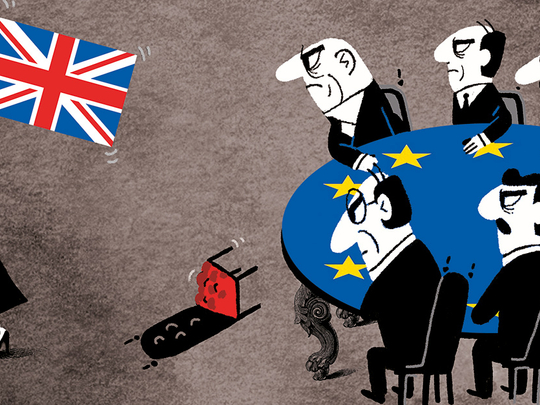
The sad day has arrived and Britain has now triggered Article 50 of the Treaty of Lisbon. It is unfortunate that Prime Minister Theresa May has decided to pander to the vicious anti-European minority in her party and will seek the toughest and most destructive form of Brexit. She has chosen to put immigration controls and rejection of any connection with European courts at the top of Britain’s priorities, which will give Britain a serious problem when it seeks a healthy trading relationship with its former partners who currently take almost half of Britain exports.
Most of the running has been made by May speaking to her audience in Britain, and the British newspapers have faithfully reported her thoughts as though they mattered. They do, but they are only half of the impending battle, since the other 27 European Union (EU) member-states have an equal place in the negotiations, and their side has been largely been overlooked. One of May’s many mistakes over Brexit has been not to reach out to the Europeans and make Brexit a joint task for the 28 states to work on together. Instead she chose a confrontational approach and has turned the talks into a 1-versus-27 clash, which carries serious dangers of failure. It is not at all clear what will happen when Article 50’s two-year time limit runs out and Britain still does not have a new relationship with the European Union.
In that all-too-likely scenario, a small example of the dangers Britain faces is what might happen over air traffic control, which has been managed for years under the Single European Sky programme that sets the rules for how airspace throughout the EU is used, which is then managed by Eurocontrol, the continental air traffic control body. Heathrow and Gatwick — like any other British airport, as well as all British airlines — benefit vastly from this trans-national cooperation. But the problem for May’s government is that if there is a dispute within this structure, the arbitration process is managed by the European courts, which she is determined to repudiate. If her ideological stubbornness leads her to walk away from this, then British airlines and airports will find themselves seriously marginalised, and if she accepts European jurisdiction over this area (as she should) there are literally thousands of other areas that need the same exception to her prejudice.
Foreign affairs
Far too much time has been spent on the economic aspects of Britain’s departure from the EU. This is dangerously wrong, as the EU has greatly expanded its role in foreign affairs, and Britain has been an important partner in that process. It is true that the EU has many failures in foreign affairs, but nonetheless it has gathered an increasingly important part in the world’s councils.
Along with France, and occasionally Germany, Britain has played a significant role in developing the EU’ foreign policies. The EU’s Foreign Affairs Council has been an important starting point for British initiatives where its Foreign Secretary met with the other 27 nations and was able to gather significant input and support for dealing with foreign policy issues. This is where the EU’s High Representative for Common Foreign and Security Policy got guidance, as in the EU’s special role in developing the Iran nuclear deal, and later seeking a common front in facing down President Vladimir Putin’s Russian expansionism.
Brexit will cut Britain off from this useful forum for both security matters and foreign policy issues. It is uncertain how May’s government would treat continued European cooperation over intelligence and security matters. And Britain would lose its partnership in the EU’s ongoing foreign affairs plans. For example, Britain will be excluded from the EU’s work in supporting the Palestinian Authority. It will also cease to have a regular forum in which it will discuss with its European neighbours and former partners what to do about the millions of refugees from Libya and Syria, and further afield. It will not be part of the European operations in the Mediterranean.
It is ludicrously hopeful of Britain’s jovial Foreign Secretary Boris Johnson to talk of rebuilding links with the US and Britain’s former imperial connections. They have all moved into the Twenty First Century and will not share Britain’s hopes of building a new global foreign policy based on 19th Century nostalgia. It is also very uncertain that the EU will want to create a new foreign policy forum that will include all EU members plus Britain.
Moreover, it will be odd for Britain to keep its permanent seat on the United Nation’s Security Council, with its all-important right of veto. The logical step will be for the former victors of Second World War, France and Britain, to lose their permanent seats, and for the EU and India to get them instead. But inertia and fear of complications may make that transition too difficult, so May’s solitary and isolated Britain will probably continue to pretend that is as important as the United States and China. Which will be relief to Britain’s excellent foreign service.










